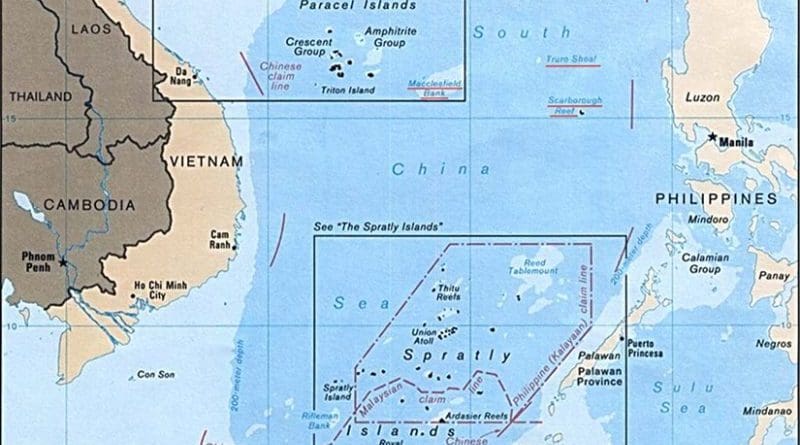South China Sea Dominates ASEAN Summit And East Asia Summit – Analysis
By Dr. Subhash Kapila and SAAG
By Dr Subhash Kapila*
South China Sea and China’s intractability on resolution of its South China Sea disputes with its ASEAN disputants found China strategically cornered with the dominating focus of global and regional leaders expressing deep concerns at these two important Summits held in Malaysian capital of Kuala Lumpur over the weekend with China still noticeably obdurate and clinging to its aggressive stand.
The two major issues on the agenda of these two Summits were to be discussions on international terrorism manifested by the ISIS threats in the background of the Paris bombings, and China’s conflictual pushes in the South China Sea. Noticeably, it was China’s defiant refusal to stop reclamation and construction of military facilities on these artificial islands in the South China Sea that trumped discussions on international terrorism. This itself is indicative of the intensity of international concerns generated by China’s aggressive brinkmanship in China’s disputes on the South China Sea disputes with its ASEAN neighbours.
Noticeable, also was the fact that while US President Obama and Japan and Australia took the lead in highlighting the South China Sea and the dangerous implications of China’s conflictual activities, ASEAN leaders with the exception of the Philippines and Vietnam were muted in their criticism of China.
Analytically, it needs to be highlighted that ASEAN as the regional grouping implicit in whose establishment was regional security has signally failed in bringing China to the table for multilateral ASEAN discussions of the South China Sea territorial and sovereignty disputes involving virtually half of ASEAN member nations. In fact ASEAN established various forums within ASEAN to draw-in China for peaceful resolution of this South China Sea dispute. That China refuses to be drawn into any multilateral discussion of the dispute highlights the dismissiveness with which China treats ASEAN.
Lack of ASEAN unity on the subject which China has contrived by dividing ASEAN countries is a signal failure of ASEAN as a regional grouping. Indicative of this was a report in the media reportage of the ASEAN Summit which quoted Singapore Prime Minister Lee Hsien Lang having casually dismissed the South China Sea dispute as merely an issue where “China and the United States do not see eye to eye”. What about China’s aggression on Vietnam and the Philippines in the Paracels and the Spratlys Islands? Does not ASEAN consider a Chinese territorial onslaught on Vietnam and the Philippines as an assault on the centrality of ASEAN as a whole and which must be met by united ASEAN political responses?
Having failed to persuade China for more than a decade to co-exist with AEAN as an existentially peaceful regional power, ASEAN has started looking for other options, other than China. Presumably with a sense of insecurity creeping-in on ASEAN on China’s conflictual potentialities in the region, it has moved ASEAN towards signing US-ASEAN Strategic Partnership preceding the Summit. Why should it have taken such a long time for ASEAN to think of it?
During the Summit, China persisted on not budging from its obstinacy on aggressive postures on the South China Sea issues. In fact, China was defiant of international opinion that China should stop work on construction of artificial islands by reclamation and developing military facilities on them. New Chinese airstrips are coming up for use by Chinese military aircraft. One media report stated that Chinese had deployed by rotation J-11 fighter aircraft. The Chinese Vice Foreign Minister that China would continue to build and maintain military facilities in the South China Sea disputed islands as it is required for China’s national security. With that sort of responses emanating from China, there does not seem to be hope for any conflict-resolution on South China Sea disputes, either by dialogues or by international arbitration.
In light of these Chinese trends, there appears to be emerging a hardening of responses from the United States, Japan and even Australia on South China Sea. The United States recently responded by despatching a US Navy destroyer to breach the12 nautical miles limit imposed by China around the artificial islands. Japan has made it known that it intends to undertake similar efforts, possibly as joint patrols with the US Navy. Within ASEAN Malaysia and Indonesia which were more noticeable earlier by their silence on the dispute even though they were disputants with China, seemed to have broken out of that shell of silence. Even India, noticeably, has lately issued strong statements by Prime Minister Modi and Defence Minister Parrikar on freedom of navigation through international waters implying that inherent in China’s construction of artificial islands in the South China Sea the ultimate Chinese intention is to impede freedom of navigation in this disputed maritime expanse.
Concluding, one is forced to assert that with China not amenable to ASEAN multilateral dialogues on South China Sea disputes inflicted by it; defiantly declaring that China will not accept any international arbitration awards on the dispute; and refusing to stop further construction of artificial islands and militarising them; all these put together, threaten regional peace and security. Under the circumstances, the convening of an International Conference on South China Sea Conflict Resolution emerges as an inescapable imperative.
*Dr Subhash Kapila is a graduate of the Royal British Army Staff College, Camberley and combines a rich experience of Indian Army, Cabinet Secretariat, and diplomatic assignments in Bhutan, Japan, South Korea and USA. Currently, Consultant International Relations & Strategic Affairs with South Asia Analysis Group. He can be reached at [email protected]

